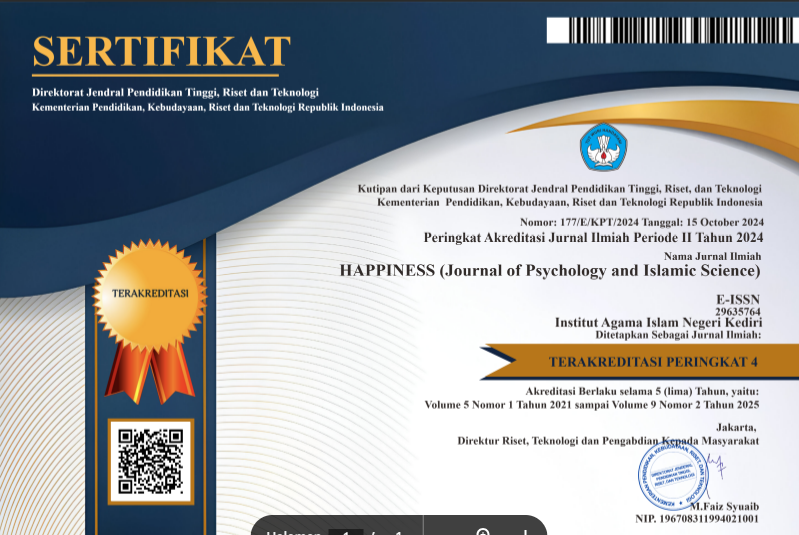Hubungan Self Efficacy dengan Kecemasan Mahasiswa dalam Menghadapi Skripsi di Tengah Pandemi Covid-19
DOI:
https://doi.org/10.30762/happiness.v6i2.559Keywords:
kecemasan, efikasi diriAbstract
This study aims to determine the relationship between self-efficacy and student anxiety in dealing with thesis in the midst of the Covid-19 pandemic. The participants in this study were 64 final students who were working on their thesis. Sampling was done by random sampling. This study uses a quantitative approach and the research instrument uses the Self Efficacy Scale adapted from Bandura (1977) and the anxiety scale adapted from Nevid et al (2003). Before testing the correlation of the data, a normality test was carried out which was tested using the Kolmogrov Smirnov one sample test. The results of the data normality test show the sign value. 0.691 > 0.005, which means that the residual values are normally distributed. Data analysis used in the study was the Product moment correlation test technique from Karl Pearson with the help of the SPSS 16 Program. The results showed that
there was a relationship between self-efficacy and student anxiety in dealing with thesis in the midst of the Covid-19 pandemic, with a sig value of 0.748 (p <0.05). From this study, the results of the relationship between the two variables were positively correlated, namely the higher the student's self-efficacy in dealing with thesis, the higher the student's anxiety.
Downloads
References
Adinugraha, R. R.,& Suprihatin, T. (2019). Hubungan antara efikasi diri dengan kecemasan pada mahasiswa angkatan 2015 yang sedang mengerjakan skripsi di Universitas Islam Sultan Agung Semarang. Prosiding Konstelasi Ilmiah Mahasiswa Unisulla (KIMU) Klaster Humaniora. 367–373.
Adiputra, S., Daharnis, D., & Syahniar, S. (2013). Efektivitas layanan bimbingan kelompok dalam meningkatkan self efficacy siswa. Konselor: Jurnal Ilmiah Konseling, 2 (2), 1–6
Alwilsol. (2007). Psikologi Kepribadian. UMM Press : Malang, hlm 287
Amiruddin, H. (2020). Cari sinyal internet untuk kuliah online, mahasiswa jatuh dari menara Masjid. Diakses 17 Oktober 2020, dari https://news.okezone.com/read/2020/05/09/609/2211324/cari-sinyal-internet-untukkuliah-online-mahasiswa-jatuh-dari-menara-masjid
Arifani, H., & Purnami, A. S. (2015). Hubungan self efficacy, motivasi dan prokrastinasi akademik dengan prestasi belajar matematika siswa kelas VIII SMP se kecamatan Kraton Yogyakarta. UNION : Jurnal Pendidikan Matematika, 3(1), 25-32
Bandura, A. (2012). On the functional properties of perceived self efficacy revisited. Journal of Management, 38(1), 9 – 44, Retrieved from https://doi.org/10.1177/0149206311410606
Bandura, A. (1997). Self Efficacy : The Exercise of Control. W.H Freeman and Company : New York, hlm 5
Bramastia. (2020). Skripsi di musim pandemi. Diakses 17 Oktober 2020, dari https://news.detik.com/kolom/d-4970968/skripsi-di-musim-pandemi
Chang, D., & Chien, W. C. (2015). Determining the Relationship between Academic Self Efficacy and Student Engagement by Meta-analysis. In 2nd International Conference on Education Reform and Modern Management (PP. 142-145) Atlantis Press. Retrieved from https://doi.org/10.2991/ermm-15.2015.37l
Durand & Barlow, D. (2006). Intisari Psikologi Abnormal. Yogyakarta : Pustaka Belajar
Fadhil, H. (2020). Harap – harap cemas mahasiswa, tugas akhir terhambat gegara Corona. Retrieved from https://news.detik.com/berita/d-4963776/harap-harap-cemasmahasiswa-tugas-akhir-terhambat-gegara-corona/1
Firmantyo, T., & Alsa, A. (2016). Integritas akademik dan kecemasan akademik dalam menghadapi Ujian Nasioal pada siswa. Psikohumaniora : Jurnal Penelitian Psikologi, 1 (1), 1-11
Firmawati, F.,& Wahyuni, S. (2018). Self efficacy dan kecemasan mahasiswa tingkat akhir di Akafarma Banda Aceh.Serambi PTK, 5(2), 65–70.
Gikas, J., & Grant, M. M. (2013) Mobile Computing device in higher education : Studen perspectives on learning with callphone, smartphone, & social media. Internet and Higher Education, 19 : 18-26. Retrieved from https://www.semanticscholar.org/paper/Mobile-computing-devices-in-higher- Vol. 6 Edisi 2 Tahun 2022 education%3A-on-%26-GikasGrant/522e07684fec22bc79b6297c8f75366988028c6e
Goulao, M. D. F. (2014). The relationship between Self Efficacy and Academic Academic Achievement in Adults Learners. Athens Journal of Education, 1 (3), 237-246
Gunadha, R., & Rahmayunita, H. (2020). Kuliah Online saat Corona picu ketimpangan akses bagi mahasiswa miskin. Retrieved from https://www.suara.com/news/2020/04/16/130712/kuliah-online-saat-corona-picuketimpangan-akses-bagi-mahasiswa-miskin
Harnani, S. (2020). Efektivitas pembelajaran daring di masa pandemi covid-19. Retrieved from https://bdkjakarta.kemenag.go.id/berita/efektivitas-pembelajaran-daring-dimasa-pandemi-covid-19
Kreitner, R., & Kinicki, E. (2003). Organizational Behavior (5th ed). Alih Bahasa : Lala Septiani Sembiring. Jakarta : Salemba 4, hlm 169
Mappi, H. (2020). Mahasiswi Unismuh Makassar meninggal saat cari internet untuk kuliah Online. Retrieved from https://news.detik.com/berita/d-4970244/mahasiswiunismuh-makassar-meninggal-saat-cari-internet-untuk-kuliah-online
Mugiarso, H., Setyowani, N., & Tedra, L, B. (2018). Self efficacy dan persistensi mahasiswa ketika skripsi ditinjau dari kecemasan akademik. Teraputik : Jurnal Bimbingan dan Konseling, 1(3), 171-175
Nevid, J. S., Rathus, S. A., & Greene, B. (2003). Psikologi Abnormal. Jakarta : Penerbit Erlangga
Panchanov, R. (2020). Keluh kesah mahasiswa kuliah Online, dari Internet lelet hingga gagal paham. Retrieved from https://radarlampung.co.id/2020/03/28/keluh-kesahmahasiswa-kuliah-online-dari-internet-lelet-hingga-gagal-paham/
Purwanto, A., Pramono, R., Asbari, M., Hyun, C., Wijayanti, L., Putri, R., & Santoso, P. (2020). Studi eksploratif dampak pandemi Covid-19 terhadap proses Pembelajaran Online di Sekolah Dasar. Journal of Education, Psychology and Counselling, 9, 1-4 Retrieved from https://ummaspul.e-journal.id/Edupsycouns/article/view/397
Rachmah, D. N. (2013). Correlation self efficacy, coping of stress and academic achievement. Jurnal Ecopsy, 1 (1), 6-12
Satria, A. (2020). Wabah corona dan adaptasi Perguruan Tinggi. Retrieved from https://news.detik.com/kolom/d-4977685/wabah-corona-dan-adaptasi-perguruantinggi
Shobabiya, M., & Prasetyaningrum, J. (2017). Konseling Kognitif untuk mengurangi Kecemasan Akademik pada Siswa SMP kelas 7. 223-230
Sofyana., & Abdul. (2019). Pembelajaran daring kombinasi berbasis WhasApp pada kelas Karyawan Prodi Teknik Informatika Universitas PGRI Madiun. Jurnal Nasional Pendidikan Teknik Informatika, 8(1) : 81-86, doi : http://dx.doi.org/10.23887/janapati.v8i1.17204
Utami, Y. G. D., & Hudaniah, H. (2013). Self efficacy dengan kesiapan kerja siswa Sekolah Menengah Kejuruan. Jurnal Ilmiah Psikologi Terapan, 1(1), 40-52 Vol. 6 Edisi 2 Tahun 2022
Yurianto., Ahmad., Bambang., Wibowo, K.P. (2020). Pedoman Pencegahan dan Pengendalian Corona Virus Deases (Covid-19). (M. I. Listiana Azizah, Aditikah Aqmarina (ed.)) Retrieved from https://www.kompasiana.com/dewiyuvita/5ef779b1097f362dd334dce2/dampakpembelajaran-online-sekolah-dasar ditengah-pandemi-covid-19
Yusuf , M. (2011). The impact of self efficacy, achievement motivation, and self regulated learning strategies on students academic achievement. Procedia Social and Behavioral Sciences, 5, 2623-2626, doi : https://doi.org/10.1016/j.sbspro.2011.04.158
Zeidner, M. (1998). Anxienty The State Of The Art. New York : Cluweer Academic Plubisher, hlm 77
Downloads
Published
How to Cite
Issue
Section
License
Copyright (c) 2022 Ulfani Fauzia

This work is licensed under a Creative Commons Attribution-ShareAlike 4.0 International License.





















